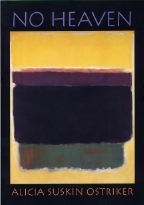 |
 Alicia Suskin Ostriker
Alicia Suskin Ostriker
No Heaven
Reviewed by: Rick Kleffel © 2005
Pitt Poetry Series / University of Pittsburgh Press
US Trade Paperback First Edition
ISBN 0-822-95875-9
Publication Date: 06-30-2005
136 Pages; $12.95
Date Reviewed: 10-24-05
Index:
General Fiction
I'm not generally a reader who picks up books of poetry. It's not that I don’t enjoy reading poetry. It just doesn't enter my world particularly often. In the first place, it takes a pretty major effort to find recent poetry, even in bookstores like Bookshop Santa Cruz. It's not like they’re piled up next to the Stephen King novels. Nor am I likely to encounter them in a UK catalogue next to the upcoming Neal Asher title.
The exception would be when poets come to town. Then their books do end up piled up where I can find them; their appearances bring them into my narrow reading vision. And so the recent Santa Cruz Poetry Festival stuck Alicia Suskin Ostriker's 'No Heaven' right under my nose, in the desk at the front of the store. Hard to miss, that. And that's why we have poetry festivals. Lest we forget, as Rudyard Kipling said.
From an invocation in Central Park South to Redondo Beach, from Botticelli's The Birth of Venus to Janacek's string quartets, from the moon to Auschwitz, Alicia Suskin Ostriker offers readers the world and more — her world — in 'No Heaven'. And while Ostriker covers a lot of ground with her poetry, there's an intimate thread that runs from each poem to the next. There are short stories here, in effect, and longer more complex narratives. In short, 'No Heaven' offers lots of reading experiences that you don’t expect when you pick up a book of poetry.
By themselves, the poems are alternately beautiful, startling and perceptive. But reading through the breadth of Ostriker's work in this collection, you will find that her poetry gains momentum, following upon itself with nuanced skill, successive poems building to deliver a message more complex than any single poem. In 'No Heaven' they offer a unity that makes the whole greater than the sum of the parts.
The title for the collection comes from the famous John Lennon lyrics, "Imagine there's no heaven..." "My two epigraphs," Ostriker says, "from Lennon and Wallace Stevens, are contrasting. Lennon's 'Imagine' is a kind of anthem of hope, while Stevens' line, 'And hard it is, in spite of blazoned days,' is a reminder of how difficult it is to keep hope alive." Those contrasts carry through the collection and invigorate it.
'No Heaven' is divided into four sections, and readers might well see each as a thematic whole. The first section "Here and Now," focuses on the world we are given, or have managed to make for ourselves. The opening poem, "Birdcall", observes language at its most basic level. "Where is?—I'm here?—an upward inflection in/Query and in response, a genetic libretto rehearsed/Tens of thousands of years beginning to leave its indelible trace." Near the end of "Here and Now", that observation of bird language returns, in "City Through Which Time Rushes Like Water": "Down here the birdlike inscriptions to Innana/Twitter to us, dignified Babylonian griffins."
Between these signposts, Ostriker writes "We carry each other's minds everywhere for safekeeping" in "Running Out the Clock", "one in a long series of marriage poems I've written over the years," she says. It's simple, almost stark, but darkly powerful. Ostriker's darker poetic instincts and inclinations keep the story of her marriage edgy and engaging.
The second section, "Archival" focuses on previously uncollected poems, many of which contribute to the story we see in "Running Out the Clock." "Material Density", the third section of the book is a fascinating look at various art forms through Ostriker's quite astute poet's eye. "Abraham's thumb digs into Isaac's jaw./ Like all Caravaggio's victims Isaac howls," she writes in "Caravaggio: the Painting of Force and Violence." Her language is blunt and masculine. Elsewhere, she's suitably chameleonic, recreating the music of "Janacek, String Quartet #1" with her language. "Cafés of mirrors, flowers,/Tubercular lovers. Oh,/Janacek, what a brace/Of hope-besotted ironists/You modern geniuses were." In every case, what's most impressive is that while Ostriker manages to make you wish to experience the artwork, her poetry creates a linguistic analogue.
The final section, "Tearing the Poem Up" ventures out into the world. What it means to be an 'innocent' American in a world racked by violence is the theme of the final section, where Ostriker taps a sense of looking on helplessly at human madness. After all, the collection is titled 'No Heaven'. But in reading Ostriker's work, one can at least get a sense of what heaven might be like.
|
 |
